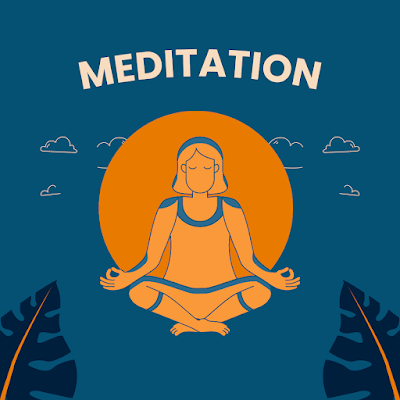Meditation
Meditation involves using the mind to train awareness or attention and a person is able to achieve a mental and emotional calm and stability. Meditation is primarily used by religious groups of various denominations. The first recorded practices of meditation (Dhyana ) exist in the Upanishads and it plays an essential part in the contemplatively oriented repertoire of Buddhism and Jainism.How to Meditate?
- Here are some basic steps you can follow to start meditating:
- Find a quiet and comfortable place to sit where you will not be disturbed. You can sit on the floor with a cushion or in a chair with your feet planted firmly on the ground.
- Close your eyes and take a few deep breaths. Focus on the sensation of the breath as it enters and leaves your body.
- Begin to pay attention to your breath and let go of any thoughts or distractions that come to mind. If you get lost in thought, simply acknowledge it and gently redirect your focus back to your breath.
- Start with a short amount of time, such as 5-10 minutes and gradually increase as you become more comfortable with the practice.
- Once you have finished meditating, take a moment to notice how you feel.
- It's important to remember that meditation is a practice, and it takes time and patience to see the benefits. Consistency and repetition are key, so try to make meditation a part of your daily routine.
- Also, you can try different techniques, such as guided meditations, body scan, loving-kindness, and so on. There are many resources available online, such as meditation apps, YouTube videos, and websites that can help guide you through the process.
Meditation: A simple, fast way to reduce stress
Meditation is a simple, yet effective way to reduce stress. It works by promoting relaxation, calming the mind, and helping to release tension in the body. When practiced regularly, meditation can help to lower levels of the stress hormone cortisol, which can lead to a reduction in symptoms of stress such as anxiety, fatigue, and irritability.
One of the main benefits of meditation is that it helps to shift focus away from negative thoughts and emotions, and towards a more positive and peaceful state of mind. This can be especially helpful for individuals who are dealing with chronic stress or who have a tendency to ruminate on negative thoughts.
Research has also shown that meditation can help to improve mood and overall well-being. It can also help to improve sleep quality, increase self-awareness and focus, and improve cognitive function.
Meditation is easy to learn and can be done by anyone, regardless of age or physical ability. It can be practiced in a variety of settings, including at home, at work, or in a park, and it doesn't require any special equipment.
In summary, meditation is a simple and effective tool for reducing stress and promoting overall well-being. It can be easily incorporated into a daily routine and practiced anywhere and at any time.
Meditation benefits
Meditation has been shown to have many benefits for both physical and mental health. Some of the most commonly reported benefits include:
Stress reduction: Meditation has been shown to lower levels of the stress hormone cortisol, which can lead to a reduction in symptoms of stress such as anxiety, fatigue, and irritability.
Improved mood: Research has shown that regular meditation can improve mood, decrease symptoms of depression and anxiety, and increase overall well-being.
Improved focus and concentration: Meditation can help to improve attention span, working memory, and cognitive flexibility, which can be beneficial for students and professionals.
Better sleep: Meditation has been shown to improve sleep quality and help people fall asleep faster, thus reducing insomnia.
Pain management: Meditation can help to reduce pain perception and increase pain tolerance, making it a useful tool for managing chronic pain.
Cardiovascular health: Meditation has been shown to lower blood pressure, improve heart rate variability, and reduce the risk of heart disease.
Increased self-awareness: Meditation can help to increase self-awareness and self-regulation, which can be beneficial for personal growth and self-improvement.
It's important to note that meditation is not a substitute for medical treatment, but it can be a useful complement to it. It's always best to consult with a healthcare professional before starting any new practice.







0 Comments